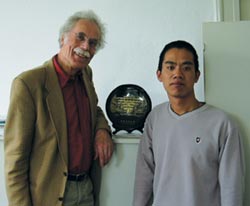German Expressionism

Sichuan student Tao Hairong found himself in a new world in Berlin
When Sichuan native Tao Hairong decided to spend a year studying at the Berlin School of Economics, it wasn't to beef up his resume but to expand his horizons. "Berlin is such a cosmopolitan city," he says. "I knew I'd be able to come into contact with people from all over the world." Before Tao, now 27, even arrived in Germany in late 2002, he had set very specific goals - academic and otherwise. "I wanted to make 10 German friends, to enter 10 German homes, and to visit at least 10 German museums," he says. He gave himself nine months, but succeeded in five.
It was his very first trip out of China. "My first impressions of Berlin were that there were very few people, not many skyscrapers, and machines were used wherever possible," Tao says. Though he had learned a great deal about German culture before his trip, no textbook could prepare him for every encounter.
"One day, I ran into a female friend on the street," Tao recalls. "She gleefully hugged me and kissed both my cheeks. I remember feeling embarrassed, but I slowly became accustomed to [the way men and women greeted one another in Germany]."
Once Tao began class, he discovered that universities in Berlin operated quite differently than those back home. "In China, most universities are like small communities," he says. "In Berlin, there seemed to be no campuses whatsoever." Rather, classrooms were housed in nondescript buildings that sat along Berlin's major thoroughfares.
As the only Chinese student in all of his classes, Tao felt he was in a unique position. "Everyone was curious about China, about where I came from and what I thought," he says. "Just because I was the only Chinese, it was easy for me to make friends." These friends introduced Tao to all parts of German culture. When he went to his first birthday party, he discovered that simply bringing a gift is not enough. In China, the host supplies the alcohol, but in Germany, the opposite was true. "Germans drink a lot," Tao says. "When you go to a party, everybody brings their own alcohol. Otherwise, the party organizer could never afford it."
Now safely back in Shanghai, Tao's fondest memories are of Germany's buses and trains. "The public transportation is so convenient," he says. "The buses are all large and comfortable. When they come to a stop, the hydraulics tilt the whole bus towards the curb, making it easier for old and disabled riders to get aboard." - D.W.
![]() 北京市通信公司提供网络带宽
北京市通信公司提供网络带宽
